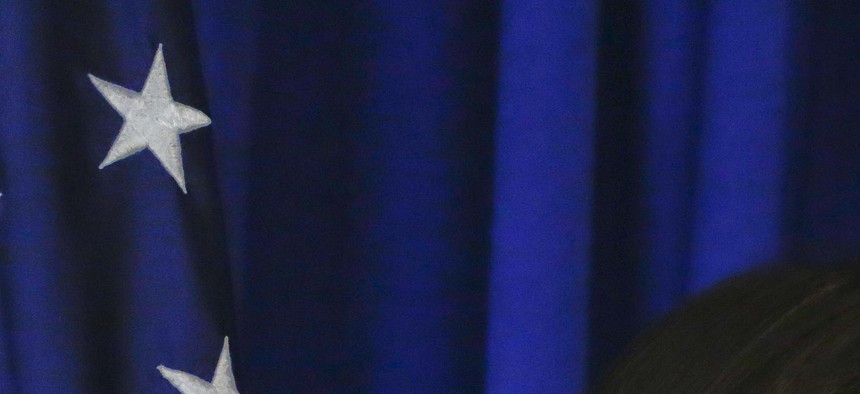Manhattan DA to Help Other Cities Dig Through Their Rape-Kit Backlogs

Mariska Hargitay of "Law & Order: SUV," left, and Manhattan District Attorney Cyrus Vance Jr. at a press conference on Wednesday. Julie Jacobson / AP Photo

Connecting state and local government leaders
As untested sexual assault evidence gathers dust in warehouses in other cities, Cyrus Vance Jr. wants to share what's worked in New York City.
New York City is stepping up to the plate to help law enforcement and sexual-assault survivors in other jurisdictions in a big way.
Manhattan District Attorney Cyrus Vance Jr. joined “Law & Order: SVU” star Mariska Hargitay on Wednesday to announce that his office was making $35 million available to help other jurisdictions process their backlogs of untested sexual assault evidence kits.
New York City, which sent 17,000 untested “rape kits” for processing between 2000 and 2003, has served as a model for other cities that have struggled to deal with their backlogs of untested evidence. Of those 17,000 untested rape kits, the Manhattan District Attorney’s Office was able to file 49 criminal indictments from hits on cold cases.
“To have hundreds of thousands of rape kits untested is unacceptable,” Vance said in his office’s announcement. “Rape victims nationwide deserve to know that the invasive examination they underwent had a purpose, and the resulting kit was not left to gather dust on a forgotten shelf.”
Vance also stressed that helping law enforcement in other states eliminate their rape kit testing backlog will not only make New York City safer, but jurisdictions across the nation safer. “From California to New York, expanding the DNA databank helps every jurisdiction across the country seek justice and keep residents safe,” he said.
Vance’s press conference on Wednesday, featured Hargitay—who has been an outspoken advocate for victims through her Joyful Heart Foundation and has pressed law enforcement across the nation to test their untested sexual assault evidence—and Kym Worthy, the prosecutor in Michigan’s Wayne County, who helped gather resources to start to dig through a backlog of 11,000 untested rape kits discovered in an abandoned Detroit police warehouse in 2009.
According to the Manhattan District Attorney’s Office’s announcement:
Wayne County Prosecutor Kym Worthy sought and received funding to test a random sample of 400 of those kits, which generated so many leads that the National Institute of Justice funded the testing of an additional 1,600 kits.
From that initial 2,000-kit sample, there were 473 hits in the national DNA database, including hits linking to crimes committed in 23 other states. The Wayne County Prosecutor’s Office identified 127 potential serial rapists, and obtained 14 convictions. Encouraged by those results, private donors contributed $150,000 to the initiative, and, in 2013, the Michigan State legislature set aside $4 million to test all of Detroit’s remaining kits.
In addition to helping to close some cold cases and convict serial rapists, the testing could help exonerate the wrongly convicted.
Although law enforcement in New York state will be given priority for the rape-kit testing funding, Vance’s office is encouraging jurisdictions from around the nation to apply.
That could include a city like Memphis, Tennessee, which is digging out from a backlog of 12,000 untested rape kits, which like in Detroit, could lead to law enforcement identifying potential serial rapists.
"Those are pretty astounding results [in Detroit] so I think it will be really interesting as Memphis tracks the hits they're getting and start getting information back," Sarah Tofte of the Joyful Heart Foundation said in March, according to LocalMemphis.com. "It's quite painful. On one hand, Detroit is being so transparent and they need to be applauded. It's hard to be so transparent about such grim news."
Vance’s office plans to share more of New York City’s experiences with processing its untested evidence.
According to his office’s announcement:
Over the coming weeks, the Office and its partners will publish a full set of “best practices” for collecting, testing, and effectively utilizing DNA found in rape kits, expanding on those developed in New York City and State over the past two decades, including:
- Performing a full audit of the jurisdiction’s untested rape kits,
- Testing each untested kit, or at the minimum, conducting a preliminary pilot program with the input of the District Attorney’s Office,
- Building and enhancing relations between police, prosecutors, and other key stakeholders,
- Adhering to a pre-established timeline and set of parameters and goals, and
- Creating mechanisms for information sharing, including DNA databases and tracking systems.
Also, Hargitay discusses the problem of untested rape kits and her Joyful Heart Foundation ...
NEXT STORY: A Sleepless Mayor for a City That Never Does





